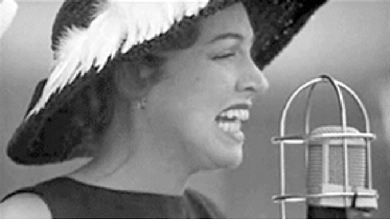By Jerry Tallmer
We lost three big ones within a week or so, and I think that everything that needed to be said has already been said about Robert Altman and Betty Comden. They were both rebels, in different ways, but Anita O’Day, who died in Los Angeles the same day (Thursday) that Betty Comden died here in New York, was the kind of rebel who made everybody else look like tea water.
When O’Day came back to New York, late in her career, for a gig at Rainbow & Stars, I interviewed her by telephone, and she was one tough cookie even then, straight to the point and no punches pulled, late in a life that had been, by gross understatement, turbulent. But now that she is gone, all I can think of, remember, is something more flexible and more imperishable — her presence, her impact, her talent, her pre-Women’s Lib color-blind go-to-Hell female self — that lives to this day in a stunning 1960 movie called “Jazz on a Summer’s Day,” the documentary (for want of a better term) that photographer Bert Stern shot at the Newport (Rhode Island) Jazz Festival of 1958.
Anita O’Day enters early in the film, does her stuff, and leaves, to be followed by dozens of other artists up to and including an iconic Louis Armstrong. Here is how — in a 1960 issue of Barney Rossett’s Evergreen Review — I perceived Ms. O’Day’s contribution:
[“Jazz on a Summer’s Day” is] the first in its particular field [the movies] to multiply a different medium against the jazz medium without the x inevitably standing for some degree of rape, discreet or violent. Further than that … it is a work suffused in tenderness, in the ordinary uncomplicated joyousness of sitting around and getting beautifully muzzy on beer as these guys blow their horns through the bright midday and the long afternoon and the soft enfolding evening of a rich little green little seaside town so far out of this world as to exist perhaps only in the now distant and disintegrate mind’s eye of the late Commodore Vanderbilt …
Meanwhile it is forever a sun-soaked summer’s noon, the camp chairs still half empty, the crowd desultorily trickling in, and in an absurdly nocturnal and floozyish and smart-as-blazes black dress and white kid gloves and huge black and white picture hat, a trim smiling she-devil named Anita O’Day is fastidiously picking her path under the open sky to the steps, the bandstand, the mike, the first sprung-bedspring break into “Sweet George Brown,” and oh yes, life is very much worth living …
Because [Bert Stern] trusted his eyes, he so aimed and held his cameras as to “go after,” zero in on, ferret out, what in each case seemed to be the root physical (or psychic-physical) source of the music being produced, and then he had the insight and stubborn courage to keep his lenses trained there for incredibly long exposures that have the ultimate impact on the spectator, not of tedium, but of thrilling revelation.
Thus for the first time in or out of a movie theatre I learn that Miss O’Day pistons her jazz up from the thorax to the rear of the mouth-chamber and then, in an endless irreverent cascade of tiny high-pressure explosions, down past the bridge of the nose and out through nostrils worked like trumpet valves and flared always with the most sophisticated sort of inner and outer amusement…
There is a new documentary, I learn from the Times obit, “Anita O’Day: Life of a Jazz Singer,” a work directed by Ian McCrudden and Ms. O’Day’s manager Robbie Cavolina. In it, critic Will Friedwald says: “When you think of the great jazz singers … Anita is the only white woman [who] belongs in the same breath as Ella Fitzgerald and Billie Holiday and Sarah Vaughan.” Higher tribute than that does not exist.
As for Robert Altman, you had to admire his guts and his angers and his quiet outrage more, sometimes, than his product; I might even forgive him, one of these days, for ripping off Renoir’s “Rules of the Game” and calling it “Gosford Park.”
And Betty — Betty Comden — I hope you will forgive me for ripping off the first and last stanzas of your and Adolph’s “Singing in the Rain,” without credit, in a piece just lately on the election. Thing is, I now can’t get the damned song out of my head. Godspeed …
































